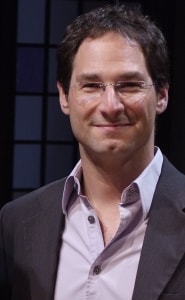EVANSTON, IL.: On Monday, Nov. 10, the board of Evanston’s Next Theatre Company announced it was ceasing operations immediately. The official announcement came shortly after the theatre’s closure had been reported by Chris Jones of the Chicago Tribune, who had been provided with a copy of an e-mail that was sent late Sunday night to the artists and crew who’d been hired for the two remaining productions in Next’s current season.
The announcement of Next’s end was perhaps less surprising than the fact that the company had even gone forward with producing the first play of its 34th season—a generally well-reviewed staging of JC Lee’s Luce, which had its final performance just hours before the casts and crews of Shakespeare’s Richard III and Jake Jeppson’s Turtle were told those jobs were no longer in the works.
It had been reported over the summer that Next owed nearly $80,000 in back rent to its landlord, the city of Evanston, as the result of mishandling of finances by recently departed managing director Jon Arndt. (Arndt declined to comment for this story, except to say in an email that he wished nothing but the best for his former colleagues.) Evanston made it clear that Next would have to find a new home after the coming season—which would have been a blessing had it worked out.
Audiences, critics and several generations of Next staffers blamed its current home, a small auditorium in the Noyes Cultural Arts Center, a former school with low street visibility, as a factor in the theatre’s inability to grow its subscriber base, budget and ambitions the way some of its neighbors in the northern suburbs of Chicago have. (Case in point: Writers Theatre in Glencoe, seven miles north of Next and about a decade younger, just broke ground on a $25-million new building designed by local starchitect Jeanne Gang.)

Jennifer Avery, Next’s final artistic director, seconded the bad-location diagnosis in a recent interview.
“We weren’t allowed to put signage outside, it’s sort of tucked away; it’s always astounding to me how many Evanstonians didn’t know that they had a theatre right in their neighborhood,” Avery said.
The rent situation was only the latest speed bump in a rocky few years that can arguably be traced back to the brief and stormy tenure of a blustery former artistic director, Jason Southerland, who left abruptly in 2010, just a year and a half into his appointment. Following Southerland’s departure came accusations of plagiarism from Israeli playwright Boaz Gaon, who said he had declined to allow Southerland to produce his adaptation of Palestinian author Ghassan Kanafani’s 1969 novella Return to Haifa. Gaon alleged that Southerland had then commissioned Chicago playwright M.E.H. Lewis to pen a new, unauthorized adaptation of Kanafani’s work, into which Lewis said Southerland pasted whole passages of Gaon’s text.
Coming after several seasons of growth under Southerland’s predecessor, Jason Loewith, the tremors started a regression. “My hope was that by this time, 2014, I’d be invited back for the opening of the new downtown [Evanston] theatre,” said Loewith this week. Loewith now helms Maryland’s Olney Theatre Center. “We all knew that’s what it had to be. And then we all had a terrible thing happen to us,” Loewith said, alluding to Southerland’s troubled tenure.
Avery, an actor who had become an artistic associate with Next under Loewith’s tenure, stepped up to become interim artistic director after Southerland’s disastrous term. “I was quite friendly with the board chair [at the time], and I asked her if we could go out for a drink, because I thought she could use one,” Avery recalled. She found herself enjoying the job, and her appointment was soon made permanent.
What Avery sees clearly now, and might wish she had sooner, is that Next Theatre “has never really had very savvy financial management. There have been brief periods of time where the company has, but there’s been a lot of times when it hasn’t.”
One of those times happened to come under her tenure, and it turned out to be worse than she and Next’s board initially realized.
“The former managing director who got us into the position of owing that much rent to the city, because he didn’t pay it and didn’t disclose that, also didn’t disclose to us a bunch of other things that had not been paid,” she said, referring to Arndt. Next managed to raise a substantial amount of funds in the wake of discovery of its rent troubles this past summer, Avery said. But much of that money got swallowed up as more and more unpaid bills were discovered.
Still, the board had signed off on continuing with the current season. A good chunk of Next’s subscriber base, though, didn’t renew, perhaps sensing trouble. And single ticket sales for Luce fell well below everyone’s hopes. And so, just two and a half weeks after announcing casting for January’s production of Richard III, to be directed by Jessica Thebus, Next had to announce the show wouldn’t go on.
As it happens, Next was where I saw my first play as a new resident of Chicago: a production of Shaw’s The Millionairess, staged in the 2001–02 season, at the tail end of the artistic directorship of Loewith’s predecessor, Kate Buckley. Buckley had followed actor/director/playwright Steve Pickering, who in turn had taken the helm from Harriet Spizziri, who co-founded the company with Brian Finn in 1981.
In Next’s three-plus decades in Evanston, it made significant marks on Chicago’s up-and-coming “Off Loop” theatre scene, some of them as deserving of attention as its only slightly older sibling, Steppenwolf. Next had the Chicago premiere of Larry Kramer’s The Normal Heart in 1986, and the debut production of eventual Pulitzer winner Tracy Letts’s first play, Killer Joe, in 1993 (reportedly scheduled for a Broadway run next year). And it developed Loewith and Joshua Schmidt’s musical adaptation of Elmer Rice’s The Adding Machine, which debuted in 2007. David Cromer’s production of that last play went from Next’s 145-seat former school auditorium to considerable Off-Broadway and regional success.

Loewith suggests that, even with its ignominious end, Next’s new-works mission was accomplished. By the time of Southerland’s flame-out, Loewith suggested, “Guess what—everybody in Chicago was already doing the work that we had helped pioneer. Not just us, all of the small theatres—we had helped create a culture where it was possible for Steppenwolf to do Suzan-Lori Parks, and for Northlight to do Eclipsed, and for Writers Theatre to start doing edgy new plays. Now that that was all happening, what niche was Next Theatre filling anymore? Everybody was doing socially provocative and artistically adventurous work.”
Avery, Loewith’s friend and eventual successor, concurred, to a point. “I think what Next was so good at was producing theatre that was truly thought-provoking,” she said of her theatre’s legacy. “That created conversation and debate well past the walls of the theatre. My favorite thing was getting calls from subscribers the next day, saying, ‘We’re still arguing about the play—I think this, she thinks that.’ And I think that’s what Next did so well.”
Kris Vire is associate editor and chief theatre critic at Time Out Chicago.


